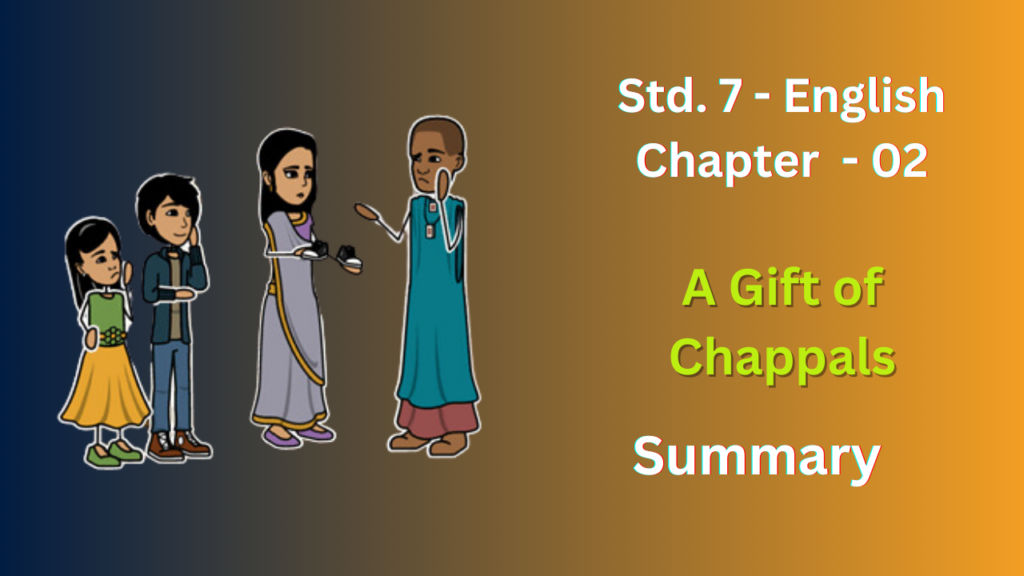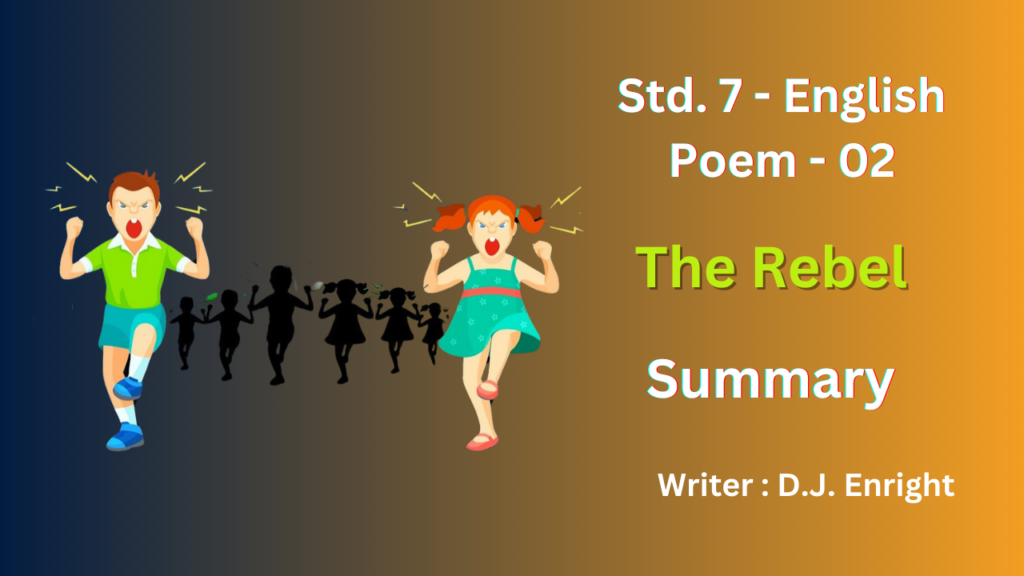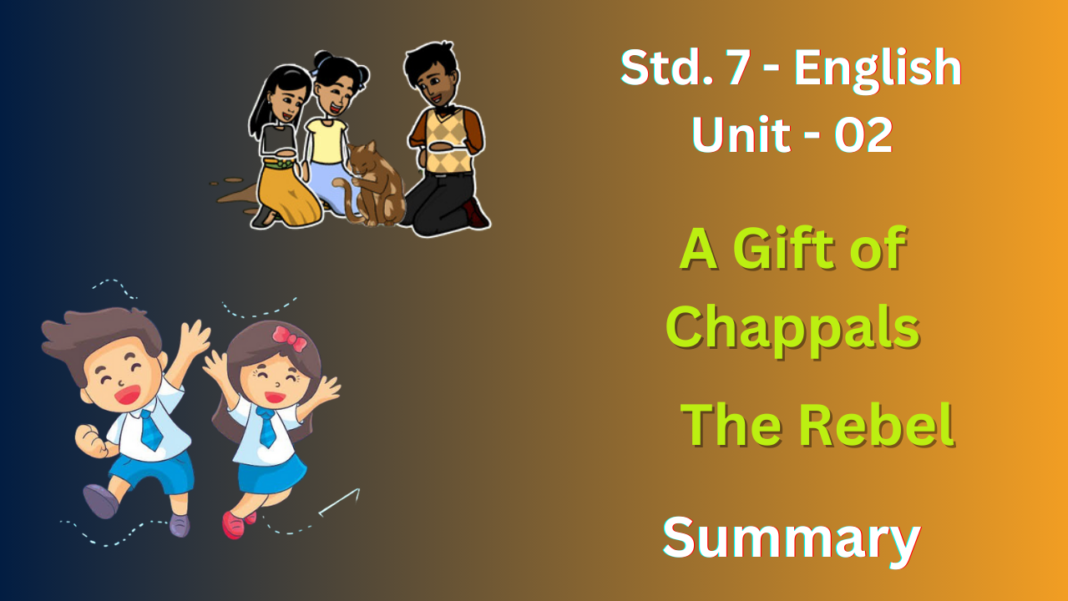NCERT Solutions for class 7 English Chapter 2
A Gift of Chappals
Here’s a more detailed summary of “A Gift of Chappals” from your 6th-grade English subject:
Setting the Stage:
- The story introduces Ravi and Mridu, siblings living with their grandmother (Patti) in a house with a backyard.
- Ravi is known for his curiosity and mischievousness, while Mridu is his confidante.
The Discovery:
- While playing in the backyard, Ravi stumbles upon a hidden object – a torn football filled with sand. Inside, he discovers a frightened kitten.
- Worried about their grandmother disapproving, Ravi hides the kitten and devises a plan to care for it secretly.
Secret Care and Cunning:
- Ravi uses his ingenuity to sneak milk for the kitten without Patti’s knowledge. He even invents a story about the kitten being a descendant of an Egyptian cat goddess to explain its presence if discovered.
- Mridu becomes involved, helping Ravi care for the kitten and keeping their secret.
The Music Teacher and the Lost Slipper:
- The music teacher, known for his strictness and bad temper, arrives for a lesson. He is a source of apprehension for both Ravi and Mridu.
- As the music teacher leaves, one of his slippers goes unnoticed and falls behind.
The Unexpected Gift:
- Mridu, on a sudden impulse, decides to give the forgotten slipper to the kitten. She fashions it as a “gift” for the scared animal.
- The story ends without revealing the consequences of Mridu’s action, leaving the reader to imagine how things unfold.
Themes Explored:
- Compassion and care: The story’s core theme revolves around Ravi and Mridu’s compassion for the helpless kitten. They go to great lengths to care for it, demonstrating their kind and nurturing nature.
- Sibling bond: The story highlights the strong bond between Ravi and Mridu. They share their secret, work together to help the kitten, and rely on each other’s support.
- Imagination and resourcefulness: Ravi’s use of imagination to create a backstory for the kitten and his resourcefulness in secretly caring for it showcase his intelligence and quick thinking.
- Potential for consequences: Mridu’s impulsive decision to give the music teacher’s slipper to the kitten introduces a sense of suspense and potential trouble. It leaves the reader wondering if they’ll get caught and how they might deal with the situation.

1. What is the secret that Meena shares with Mridu in the backyard?What is the secret that Meena shares with Mridu in the backyard?
Ans : In the story “A Gift of Chappals,” Meena shares the secret that they have found a kitten hidden in their backyard. The text doesn’t mention Meena specifically, but Ravi discovers the kitten and shares the secret with his sister Mridu. They work together to keep the kitten a secret from their grandmother and care for it in the backyard.
2. How does Ravi get milk for the kitten?
Ans : Ravi uses his cunning and quick thinking to get milk for the kitten without his grandmother’s (Patti’s) suspicion. Here’s how:
- Feigned Hunger: He grabs a glass of milk, pretending to be hungry himself.
- Drinking Most of the Milk: To maintain the act, he drinks a good portion of the milk, leaving some remaining in the glass.
- Sneaking the Milk: He then rushes to the backyard where he keeps the kitten hidden. There, he pours the remaining milk into a coconut shell, creating a makeshift bowl for the kitten to drink from.
- Returning the Glass: After the kitten has finished, Ravi quickly washes the glass and returns it to the kitchen before Patti notices anything unusual.
3. Who does he say the kitten’s ancestors are? Do you believe him?
Ans : Ravi claims that the kitten’s ancestors are the Mahabalipuram Rishi-cats, descendants of the cat-goddess of Egypt.
Do we believe him?
No, it’s highly unlikely that Ravi’s story about the kitten’s lineage is true. However, it highlights his resourcefulness and his desire to protect the kitten. He invents a believable story to explain the kitten’s presence in case anyone discovers it.
4. Ravi has a lot to say about MP Poonai. This shows that
- he is merely trying to impress Mridu.
- his knowledge of history is sound.
- he has a rich imagination.
- he is an intelligent child.
Which of these statements do you agree/ disagree to?
Ans : I agree with both he has a rich imagination and he is an intelligent child.
5. What was the noise that startled Mridu and frightened Mahendran?
Ans : The noise that startled Mridu and frightened Mahendran in “A Gift of Chappals” was Lalli’s attempts at learning to play the violin. The story doesn’t explicitly describe the sound, but it mentions “kreech” which suggests the unpleasant and likely uncoordinated sounds of a beginner violinist.
Working with text – II
Complete the following sentences.
(i) Ravi compares Lalli’s playing the violin to_______
(ii) Trying to hide beneath the tray of chillies, Mahendran_______
(iii) The teacher played a few notes on his violin, and Lalli________
(iv) The beggar said that the kind ladies of the household_________
(v) After the lesson was over, the music teacher asked Lalli if_______
Ans :
(i) Ravi compares Lalli’s playing the violin to a cat sharpening its claws on a blackboard.
(ii) Trying to hide beneath the tray of chillies, Mahendran sneezed loudly.
(iii) The teacher played a few notes on his violin, and Lalli tried to copy him.
(iv) The beggar said that the kind ladies of the household always gave him something.
(v) After the lesson was over, the music teacher asked Lalli if she had practiced.
2. Describe the music teacher, as seen from the window.
Ans : The music teacher was thin and bald, with a ring of black hair around his ears. A gold chain glittered against his wrinkled neck, and a diamond sparkled on his finger. As the music played, he tapped his bony foot impatiently.
3. (i) What makes Mridu conclude that the beggar has no money to buy chappals?
(ii) What does she suggest to show her concern ?
Ans :
(i) Mridu concludes that the beggar has no money to buy chappals because of his wounded feet. The story likely describes the blisters or callouses on his bare feet, indicating he walks long distances without proper footwear. This suggests a lack of resources to afford chappals.
(ii) Mridu suggests finding an old pair of chappals to give to the beggar. This shows her concern for his well-being and her desire to help him protect his feet.
4. “Have you children….” she began, and then, seeing they were curiously quiet, went on more slowly, “seen anyone lurking around the verandah ?”
(i) What do you think Rukku Manni really wanted to ask?
Ans : Rukku Manni likely wanted to ask directly if the children had seen the missing slipper.
(ii) Why did she change her question ?
Ans: She started broadly with “Have you children…” because:
* She might have been hesitant to directly accuse the children of knowing something.
* It could be a way to gauge their reaction before asking a more specific question.
(iii) What did she think had happened ?
Ans : Rukku Manni likely suspected the children might know something about the missing slipper because:
* They were curiously quiet, which could be seen as suspicious.
* The missing slipper belonged to the strict music teacher, and children might be more likely to notice or be involved in something related to him
5. On getting Gopu Mama’s chappals, the music teacher tried not to look too happy. Why ?
Ans : The music teacher tried not to look too happy about receiving Gopu Mama’s chappals for a few possible reasons:
- Maintaining his image: The story portrays the music teacher as strict and bad-tempered. He might want to maintain this image and avoid appearing overly grateful or enthusiastic about receiving a hand-me-down pair of slippers.
- Hiding his desperation: Accepting used chappals could be seen as an admission of his poverty or lack of resources to buy new ones himself. He might try to hide his desperation by appearing nonchalant.
- Disliking the chappals: It’s possible the music teacher simply doesn’t like Gopu Mama’s old chappals. Perhaps they are worn out, uncomfortable, or not his style. He might be trying to conceal his disappointment.
6. On getting a gift of chappals, the beggar vanished in a minute. Why was he in such a hurry to leave ?
Ans : The beggar vanished in a minute after receiving the chappals because of a few possible reasons:
- Fear of the chappals being taken back: The beggar might have been worried that the children, who gave him the chappals without asking permission from an elder, would be caught and the chappals taken away from him. Leaving quickly ensured he kept the gift.
- Fear of punishment: If giving away something to a beggar was against the household rules, the beggar might have feared getting scolded or even punished by the children’s elders for accepting the chappals. A quick departure minimized the risk of getting caught.
- Desire for privacy: The beggar might have preferred to examine the chappals in private, away from the watchful eyes of the children or others. Leaving quickly allowed him to find a secluded spot.
7. Walking towards the kitchen with Mridu and Meena, Rukku Manni began to laugh. What made her laugh ?
Ans : Rukku Manni pictured Gopu Mama searching for his missing chappals, finding the situation humorous.
Working With Language
1. Read the following sentences:
(a) If she knows we have a cat, Paati will leave the house.
(b) She won’t be so upset if she knows about the poor beggar with sores on his feet.
(c) If the chappals do fit, will you really not mind ? Notice that each sentence consists of two parts. The first part begins with ‘if’. It is known as if-clause.
Rewrite each of the following pairs of sentences as a single sentence. Use ‘if’ at the beginning of the sentence.
(a) Walk fast. You’ll catch the bus.
If you walk fast, you’ll catch the bus.
(b) Don’t spit on the road. You’ll be fined.
If you spit on the road, you’ll be fined.
(i) Don’t tire yourself now. You won’t be able to work in the evening.
(ii) Study regularly. You’ll do well in the examination.
(iii) Work hard. You’ll pass the examination in the first division.
(iv) Be polite to people. They’ll also be polite to you.
(v) Don’t tease the dog. It’ll bite you.
Ans :
(i) If you don’t tire yourself now, you’ll be able to work in the evening.
(ii) If you study regularly, you’ll do well in the examination.
(iii) If you work hard, you might pass the examination in the first division. (Note: “might” is added here because passing in first division usually requires more than just hard work.)
(iv) If you are polite to people, they will also be polite to you.
(v) If you don’t tease the dog, it won’t bite you.
2. Fill in the blanks in the following paragraph. Today is Sunday. I’m wondering whether I should stay at home or go out.
If I …………. (go) out, I ………….. (miss) the lovely Sunday lunch at home. If I …………….. (stay) for lunch, I………………… (miss) the Sunday film showing at Archana Theatre. I think I’ll go out and see the film, only to avoid getting too fat.
Ans :
Today is Sunday. I’m wondering whether I should stay at home or go out. If I go out, Iwill miss the lovely Sunday lunch at home. If I stay for lunch, I will miss (miss) the Sunday film showing at Archana Theatre. I think I’ll go out and see the film only to avoid getting too fat.
3. Complete each sentence below by appropriately using any one of the following:
If you want to/if you don’t want to/if you want him to
(i) Don’t go to the theatre……………
(ii) He’ll post your letter…………………..
(iii) Please use my pen …………..
(iv) He’ll lend you his umbrella……..
(v) My neighbour, Ramesh, will take you to the doctor
(vi) Don’t eat it ……
Ans :
(i) Don’t go to the theatre if you don’t want to.
(ii) He’ll post your letter if you want him to.
(iii) Please use my pen if you want to.
(iv) He’ll lend you his umbrella if it rains.
(v) My neighbour, Ramesh, will take you to the doctor if you don’t feel well.
(vi) Don’t eat it if it’s expired.
The Rebel
The poem “The Rebel” likely doesn’t exist in a standard 6th-grade English curriculum. There are many poems with the title “Rebel” by various authors, so it’s difficult to pinpoint the specific one without more details.
However, based on the title “The Rebel,” we can make an educated guess about the poem’s theme:
- Nonconformity: The poem might explore the idea of someone who challenges the status quo, who doesn’t follow the crowd or established norms.
- Individualism: It could focus on the importance of thinking for oneself and having the courage to express one’s own beliefs, even if they differ from others.
- Breaking free from tradition: The poem might explore the concept of defying established traditions or expectations, forging one’s own path.
Here are some additional details that might help identify the specific poem:
- Do you remember any lines or phrases from the poem?
- Was there a specific author mentioned?
- Was the poem part of a specific unit or theme in your textbook?
If you can provide any of these details, I can help you find a more accurate summary of the poem “The Rebel.”

Answer the following questions
(i) If someone doesn’t wear a uniform to school, what do you think thee teacher will say ?
Ans : The teacher might say something like, “Please see me after class about the uniform policy,” depending on the school’s strictness.
(ii) When everyone wants a clear sky, what does the rebel want most ?
Ans :
- Rain: This is the classic answer, symbolizing the rebel’s desire to oppose the majority’s wish.
- A storm: An even more dramatic deviation from the clear sky everyone else wants.
- Stars: If the clear sky is desired for sunshine, the rebel might prefer the nighttime with its mysteries and hidden beauty.
- Clouds for artistic inspiration: The rebel might appreciate the shapes and formations of clouds, finding inspiration in their fleeting nature.
(iii) If the rebel has a dog for a pet, what is everyone else likely to have ?
Ans : If the rebel has a dog for a pet, everyone else is likely to have cats.
This answer plays on the idea of the rebel going against the mainstream. Dogs are often seen as loyal, playful companions, while cats can be more independent and aloof. By choosing a dog, the rebel demonstrates their preference for something different from the potentially more popular choice of cats.
(iv) Why is it good to have rebels ?
Ans : Rebels are good because they:
- Challenge the norm, sparking progress.
- Promote tolerance of different ideas.
- Keep those in power in check.
(v) Why is it not good to be a rebel oneself ?
Ans : Being a rebel all the time might lead to:
- Isolation: People might not want to be around someone who constantly disagrees.
- Missed chances: Rebelling against everything could mean missing out on good experiences.
(vi) Would you like to be a rebel ? If yes, why ? If not, why not?
Ans : While I value challenging ideas, gaining respect often comes from working within the system.
2. Find in the poem an antoynm (a word opposite in meaning) for each of the following words.
(i) long ………………
(ii) grow …………
(iii) quietness ………….
(iv) sober. ……………..
(v) lost ………
Ans :
(i) long – short
(ii) grow – shrink
(iii) quietness – noise
(iv) sober – fantastic
(v) lost – found
3. Find in the poem lines that match the following. Read both one after the other.
(i) The rebel refuses to cut his hair.
(ii) He says cats are better.
(iii) He recommends dogs.
(iv) He is unhappy because there is no sun.
(v) He is noisy on purpose.
Ans :
(i) when everyone has short hair.
(ii) When everyone loves dog.
(iii) When everyone loves cat
(iv) When everyone wishes for sun
(v) When everyone wishes to be quiet.
FAQ’s
What stories are included in NCERT Class 7 English Chapter 2?
Chapter 2 of Class 7 English features two compelling stories: “A Gift of Chappals” and “The Rebel.”
Can you provide a brief summary of “A Gift of Chappals”?
“A Gift of Chappals” narrates a heartwarming tale of selflessness and kindness, emphasizing the value of empathy and generosity.
What is “The Rebel” about?
“The Rebel” is a thought-provoking story that explores the theme of rebellion against injustice and oppression, showcasing the courage and resilience of the human spirit.
How do NCERT Solutions for Class 7 English Chapter 2 assist in understanding these stories?
These solutions offer comprehensive analyses and interpretations of the texts, aiding students in grasping the themes, characters, and literary techniques employed in “A Gift of Chappals” and “The Rebel.”
Why are “A Gift of Chappals” and “The Rebel” important for students?
These stories provide valuable insights into human experiences and emotions, fostering empathy, critical thinking, and moral reasoning among students.









